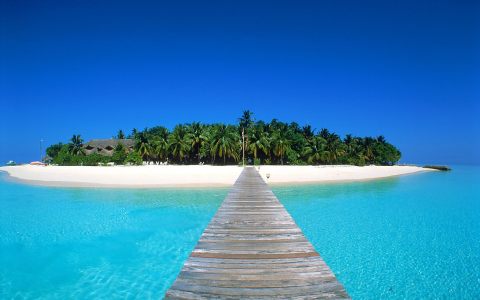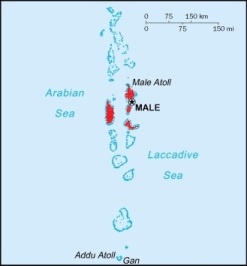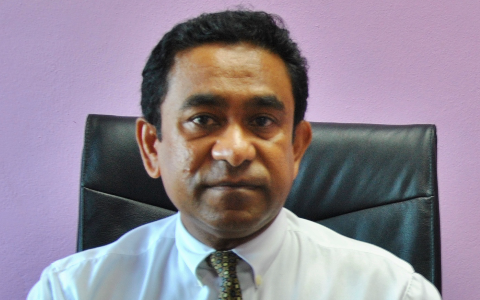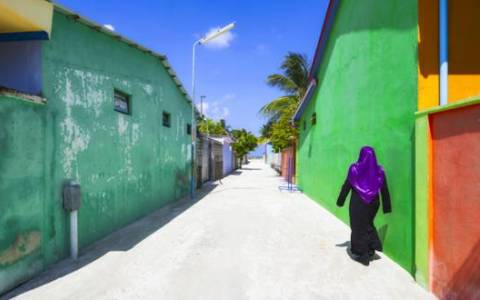Maldives Home Minister remains ‘firm’ on death penalty
by - 26th February 2014

AS SUMMER sun beckons, the Maldives - paradise destination for thousands of western newlyweds and holidaymakers – remains bent on introducing the death penalty.
Crime has reached such proportions that this Commonwealth nation is set to become the ninth to implement capital punishment - by lethal injection, Home Minister Umar Naseer announced last month (January).
The Indian ocean archipelago hosts thousands of Western tourists every year – mostly to uninhabited Maldive atolls.
 It had its last execution 11 years before the British (who did not generally interfere in the internal governance of the nation, merely controlling foreign relations and introducing western education) left in 1965.
It had its last execution 11 years before the British (who did not generally interfere in the internal governance of the nation, merely controlling foreign relations and introducing western education) left in 1965.
Fifty years later, the nation’s Home Minister Umar Naseer has ordered the Maldives Correctional Services (MCS) to introduce lethal injection at the prison in Medhu Uthuru Province.

President Abdulla Yameen claims the instruction reflects merely his Minister’s opinion, and that his Cabinet has yet to discuss the move.
However, Naseer told Lapido in a telephone interview this week that his directive stands, and preparations were underway, despite discussions pending.
Murders, gang violence, inter-gang fighting and contract killings had increased in the Maldives, the minister told us, citing the murder in October 2012 of politician and Islamic scholar, Dr Afrasheem Ali.
A criminal court had sentenced Hussain Humam Ahmed to death for his murder - just days before the Home Ministry decision on capital punishment.
Capital punishment would be implemented only after all appeal processes were exhausted and the government would not seek to expedite or slow down judicial processes in death penalty cases, Naseer told Lapido.
Black magic
The Maldives has had no executions after Hakim Didi was put to death in 1954 for practising ‘black magic’.
He was convicted of killing Huvadhu atoll chief Veeru Ali Didi with a mixture of brewed tea and poisonous fish with ‘an evil spell’. The convict was tied to a tree and shot dead.
Maldivian law provides for capital punishment for crimes such as apostasy under sharia, but successive presidents have used the Clemency Act to commute death penalties to life imprisonment.
There are currently 19 prisoners on death row, according to US-based branch of Amnesty International, which is urging the Maldives to halt the move.
‘There is no such thing as a “humane” way to put someone to death, and no evidence that the threat of execution works as a deterrent to crime. Maldives should put an immediate end to such plans now, and instead abolish the death penalty in law once and for all,’ Abbas Faiz, Maldives Researcher for the advocacy group, said in a statement.
Amnesty is particularly concerned about retrospective sentencing of children to death for crimes they committed under sharia before they attained their majority at 18.
Asked by Lapido to respond to the rights group’s criticism, Naseer criticized studies that denied capital punishment was a deterrent.
Serious crime required ‘firm action,’ the minister said, adding that executions would deal a ‘serious blow’ to the growing crime rate.
Corrupt
The Maldives’ judiciary is widely seen as politicized and corrupt. UN Special Rapporteur on the Independence of Judges and Lawyers, Gabriela Knaul, investigated the archipelago’s judiciary last February, and expressed ‘serious concerns’ over inconsistencies and gaps in the nation’s legislation.
There was no Criminal Procedure Code, no Sentencing Act and no Civil Procedure Code, she noted.
She said judges did not appear fully to acknowledge or understand ‘the basic requirement of impartiality’.
This could lead to the dangerous perception that the justice system was politicized and even corrupted, she added.
Many members of the judiciary, including in the Supreme Court, held membership of political parties, she said.
Sunni
The Maldives is not a bastion of diversity. All 330,000 citizens of its 1,192 islands are Sunni Muslim, it is claimed.

Non-Muslims are barred from citizenship, according to Article 9 of the Constitution. Article 10 states that no law ‘contrary to any tenet of Islam’ can be enacted.
The South Asian nation became a multiparty democracy in 2008, after 30 years of autocratic rule under the presidency of Maumoon Abdul Gayoom. President Yameen, who assumed office last November, is the half-brother of Gayoom.
During his election campaign, Yameen pitched himself as ‘saviour of Islam’ against his Anglophile opponent, the Liverpool Polytechnic-educated Mohamed Nasheed, leading to the suspicion that he is using Islam’s hudud provisions to shore up the religion vote.
Murder
Before the elections he said that a recent spate of killings had led to his ‘change of heart’ on the death penalty.
‘Murder has to be punished with murder,’ he said. ‘I believe that the death penalty is necessary to save society.’
Vice President Dr Mohamed Jameel Ahmed is also a proponent of capital punishment. As Home Minister he was on record as saying his office would not hesitate to impose the death penalty if there was consensus among relevant authorities.
‘It is not something new. It is practiced in Islamic sharia and common law,’ he said.
Under sharia law, families of murder victims can seek the death penalty as qisas, or retaliation.
Adultery and apostasy are also punishable by death.
Indication of the political pressures behind the move are evident. Islamic group Jamiyyathul Salaf has already called for beheading or use of firing squad instead of lethal injection.
They argue that beheading would provide the heirs of the victim ‘satisfaction’.
Background information supplied by http://minivannews.com/about-us - the Maldives’ first fully independent platform for free expression, based in the capital Malé.
